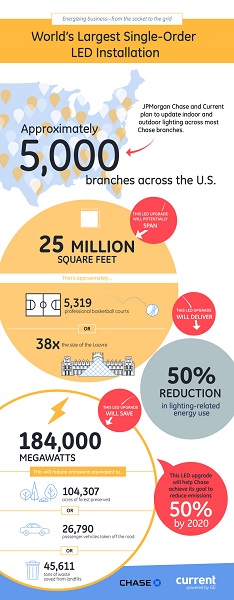 |
Current, powered by GE secures a deal with financial giant J.P. Morgan to install LED lighitng across the organization's U.S. branches. (Current/LEDinside)
|
Current, powered by GE, announced a deal with JPMorgan Chase & Co. to install LED lighting across most of Chase's U.S. branches. Potentially spanning 25 million square feet across roughly 5,000 branches, the project is the world's largest single-order LED installation to date.
Current estimates that, once completed, the project could reduce the branches' lighting-related energy use by more than 50 percent– equal to taking nearly 27,000 cars off the road.
"We are always looking for better ways to manage our branches in an efficient and sustainable manner," said Barry Sommers, CEO of Chase Consumer Banking. "This helps us deliver on that goal by reducing the energy we use in the communities we serve."
The announcement comes just four months after the formation of Current, a first-of-its-kind energy start-up within GE that integrates GE's LED, Solar, Energy Storage and Electric Vehicle businesses with its industrial strength software platform, Predix.
"LED commercial usage is anticipated to grow from 28 percent today to 95 percent by 2025, unlocking tremendous value for our customers to reduce energy cost and complexity in commercial enterprises," said Maryrose Sylvester, President and CEO of Current. "Chase understands this shift and is a frontrunner in leading the transformative change in distributed energy by leveraging LEDs to optimize energy efficiency."
Leaders from Chase and Current celebrated the project by ringing the closing bell of the New York Stock Exchange on February 18, alongside six other companies working with Current on energy-saving projects, including Hilton Worldwide and Hospital Corporation of America.
 |
Infographic of J.P. Morgan LED lighting conversion project. (Current/LEDinside)
|
Enabling Intelligent Environments
Current announced an intended agreement with Capgemini to unleash more than 200 developers on Predix, which opened for general availability this week. The developers will be focused on creating software solutions that will help commercial and industrial customers reduce power consumption, generate power onsite, and drive new revenue streams through the use of sensors and networked systems in buildings and cities.
To accelerate municipal adoption of intelligent infrastructure within cities, Current announced a commercial agreement with Intel to partner on Intelligent City proposals and opportunities. Current's intelligent streetlamps will also be built using the Intel® IoT Platform, an edge to cloud reference architecture with hardware and software building blocks from Intel. The Intel products will process large and evolving data loads quickly with the reliability and flexibility demanded by cities today.
"Populations in cities around the world are growing exponentially, and forward-looking municipal leaders are turning to digital technologies to improve the economic and environmental health of their cities," said Sylvester. "Through our collaboration with Intel we will accelerate the development of intelligent technologies to help cities pull and access data in ways they haven't before to solve challenges and create new opportunities for both city workers and residents."
These partnerships build on the existing ecosystem Current has begun to build in the Intelligent Cities space by partnering with leaders like AT&T and ShotSpotter.
Building the App Economy for Intelligent Buildings
To create an industrial app economy for intelligent buildings and cities, Current is tapping into the global developer community. The company received more than 100 sensor and application ideas from 13 countries for its intelligent LED lighting as part of a one-week idea generation challenge with TopCoder. The contest sought ideas that brought together lighting hardware, sensors and a personalized user experience in various intelligent environments, like retail, commercial offices and more.
Winning ideas, which were chosen to seed themes for potential development, include a conference room management app for enterprise that can instantly reserve meeting space based on an individual's location in a building and calendar commitments; a retail app that alerts shoppers to clothing options based on body type, cost and size availability; and an event app that allows sports enthusiasts to instantly identify available parking options, receive alerts on public transportation options based on traffic patterns, suggest food and drink vendors in proximity to seat location at a venue, and more.





 CN
TW
EN
CN
TW
EN







